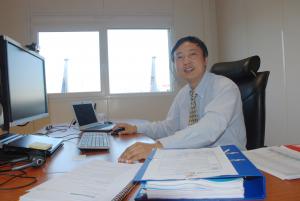Administrator with a passion for scientific collaboration
7 Oct 2011
-
Sabina Griffith
His father was not very pleased when he learned that his son Ju was to head for a career in administration. Being a chemical engineer himself, he thought that Ju should rather pursue something more tangible, some craft that followed the strict and understandable laws of science. "But I was young and did not listen," says Ju, all smiles. By now his father, aged 92, will have revised his opinion over his son's decision. From this week on, Ju Jin will lead the Directorate for General Administration within the ITER Organization, one of the world's largest scientific endeavors.
Ju Jin was born in Beijing in 1959, which proved to be good timing. By the time he made it to university in 1978, the ten-year Cultural Revolution had just come to an end. He was among the first batch of undergraduate students since the re-establishment of the national examination system in 1977. That didn't mean, however, that Ju didn't get his share of "agri" culture. "During my school years I was sent to work in the fields several times, but looking back today I think this was not a bad thing but a valuable experience. It taught me to respect and cherish what we eat and drink every day because it requires hard and physical labor to produce."
Ever since graduation, Ju Jin's career has been dedicated to facilitating international scientific collaboration. He was in charge of the joint activities between China and other international organizations, and also between China, Asia and Africa, at the Chinese Commission of Science and Technology. He started a bilateral fund between China and Israel and a similar fund between China and Australia. His career brought him and his family to the US, Australia and back to the US again where he was minister-counselor for science and technology at the Chinese Embassy for the past six years.
Asked about his interest in promoting scientific collaboration across borders, Ju answers: "Big science projects need not only a great number of talented people from around the world but also huge investment. Scientific cooperation can play an important role in pooling the necessary resources and can be of mutual benefit because both partners have their own comparative and complementary advantages."
Joining the ITER Organization has been a bit of a homecoming: back in 2002 Ju Jin lead the Chinese initiative to join ITER. "Our first attempt to convince the government to join the project was difficult," Ju remembers. "Although it was recognized as an investment in high-technology, fusion seemed to be too far away on anybody's timescale. So the minister and vice-ministers of the Ministry of Science and Technology (MOST) had to be convinced first."
In 2003, Ju Jin led the governmental delegation to Japan to begin the discussions with representatives of ITER. "There were very intense discussions ... and not only because of the large investment needed. There was debate within the Chinese fusion community about whether we were backing the 'right horse' by going for the tokamak, or whether the stellarator or even inertial fusion was the better option." Due to a concerted effort between the Chinese Ministry of Science and Technology and the Chinese fusion community, the State Council finally agreed to formally start the negotiation for China to join ITER.
Now Ju Jin is very much looking forward to his new challenge. Although still on a steep learning curve in his first week, one of his main goals is set: "I want to improve the efficiency of work." Instead of emails, he'd like to encourage his staff to talk to each other. And, as far as this author can tell, talking to Ju Jin is a real pleasure!
Now Ju Jin is very much looking forward to his new challenge. Although still on a steep learning curve in his first week, one of his main goals is set: "I want to improve the efficiency of work." Instead of emails, he'd like to encourage his staff to talk to each other. And, as far as this author can tell, talking to Ju Jin is a real pleasure!


